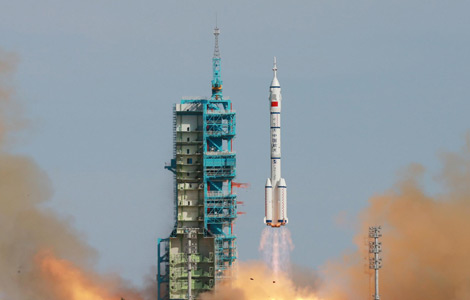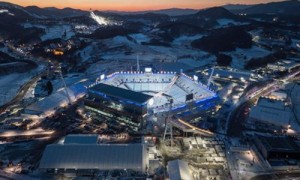周二下午,中国成功发射第五架载人飞船神舟十号。在长征二号F运载火箭的发射下,神舟十号在酒泉卫星发射中心成功升空进入预定轨道。
 cription="编辑提供的本地文件" sourcename="本地文件" style="width: 470px; height: 300px" />
cription="编辑提供的本地文件" sourcename="本地文件" style="width: 470px; height: 300px" />China successfully launched its fifth manned spacecraft on Tuesday afternoon, announced Zhang Youxia, chief commander of China's manned space program.
Shenzhou-X, atop an upgraded Long March-2F carrier rocket, blasted off from the Jiuquan Satellite Launch Center in northwest China late Tuesday afternoon and entered its designated orbit minutes later.
Three astronauts, two male and one female, are aboard the spacecraft.
A see-off ceremony was held at the center hours before the launch. Chinese President Xi Jinping, who just returned from his visit to the United States, attended the ceremony and extended good wishes to the three astronauts.
"The mission's members carry a space dream of the Chinese nation, and represent the lofty aspirations of the Chinese people to explore space," said Xi who watched the launch process in Jiuquan.
In its 15-day journey, the spacecraft will dock with the orbiting space lab Tiangong-1 twice, once through automatic operation and the other manual, and a lecture will for the first time be given on board of the assembled orbiter to a group of students on the ground.
Special report
This mission aims to further test technologies of docking and supporting astronauts' stay in space, as well as use new technologies related to the construction of a space station, according to Wu Ping, China's manned space program spokeswoman, at a press conference on Monday.
The Tiangong-1 space lab has been in orbit for about 620 days and about three months are left before the designated end of its service.
The module is considered the first step for China to operate a permanent space station around 2020 and make it the world's third country to do so.
There are risks that the conditions of some components on the Tiangong-1 might not be at their best since the module is near the end of its service and has gone through four docking tests, Wu said.
Nie Haisheng, commander of the three-member crew and second time space traveler, said this mission will be longer, with more experiments to be conducted, than his previous mission in 2006.
"It will be a new challenge with greater risks," Nie told the media on Monday.







